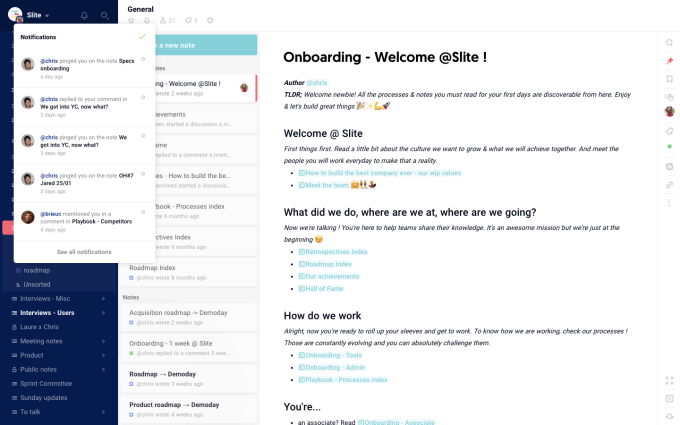Slack exposed the demand for a dead-simple internal communications tool, which has inspired a wave of startups trying to pick apart the rest of a company’s daily activities — including Slite, which hopes to take on internal notes with a fresh round of new capital.
Slite is more or less an attempt at a replacement for a Google Doc or something in Dropbox Paper that is sprawling and getting a little out of control. An employee might create a Slite note like an onboarding manual or an internal contact list, and the hope is to replace the outdated internal wiki and offer employees a hub where they can either go and start stringing together important information, or find it right away. The company today said it has raised $4.4 million in a new seed funding round led by Index Ventures after coming out of Y Combinator’s 2018 winter class. Ari Helgason is joining Slite’s board of directors as part of the deal.
“We now have to develop this product enough to show we can actually replace large amounts of things,” co-founder Christophe Pasquier said. “Today we have more than 300 active teams, and we have to show that we can make it scale. In the short term is just we’re replacing Google Docs because these tools haven’t evolved and we’re bringing something super fresh. The longer-term vision of really bringing all the information that has value from a team and becoming this single source of truth for teams.”

Slite tracks permissions and changes to the notes in order to allow companies to do a better job of maintaining them, rather than sharing around links and having different people jump in and make changes. The part about sharing links is one in particular that stung for Pasquier, as even larger companies can have issues with employees asking in Slack what policies are — or even for links to parts of the internal wiki where that important information is buried.
Getting there certainly won’t be easy. Companies like Dropbox continuing to invest in these kinds of collaborative note-taking tools — that could easily evolve into internal hubs of information. And as Pasquier tries to liken the development arc to Slack, which showed employees wanted some more seamless tool for communication, that company is also working on making its search tools smarter, like helping employees find the right person to ask a question. It doesn’t look like an asynchronous notes tool just yet, but if all the information is somewhere in Slack already, a smart search tool may be the only thing necessary to find all that information.
